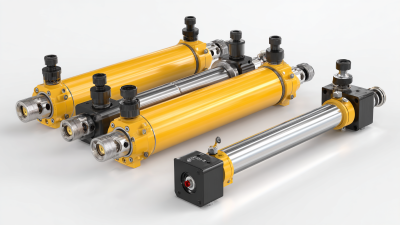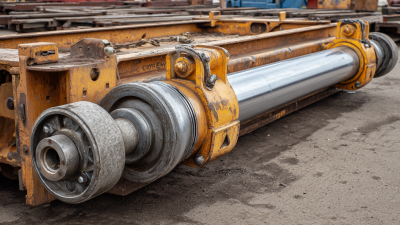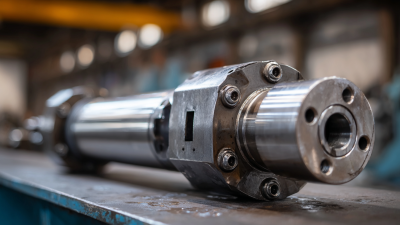
Maximizing Efficiency: The Advantages of Upgrading Your Hydraulic Oil Cylinder Systems
In today's fast-paced industrial landscape, the pursuit of efficiency and productivity is more critical than ever. One often-overlooked component that can significantly impact operational efficiency is the Hydraulic Oil Cylinder. These systems play a vital role in various applications, from manufacturing machinery to construction equipment, where they deliver power and precision.

However, as technology advances and operational demands evolve, upgrading your Hydraulic Oil Cylinder systems can yield substantial benefits. This blog will explore how modern hydraulic oil solutions not only improve performance but also enhance reliability, reduce maintenance costs, and increase overall system longevity. By investing in upgraded hydraulic oil cylinders, businesses can maximize their efficiency and ensure that their operations remain competitive in a rapidly changing market.
Understanding Hydraulic Oil Cylinder Systems: A Comprehensive Overview
Hydraulic oil cylinder systems play a crucial role in various industrial applications, providing the necessary power to lift, push, or pull heavy loads with precision.
Understanding the components of these systems is essential for anyone involved in machinery maintenance or operations. At the core, hydraulic cylinders convert hydraulic energy into mechanical force through the movement of a piston within a cylinder chamber, driven by pressurized oil.
This mechanism allows for smooth, controlled movements that can be finely tuned based on the system's design.
In addition to the basic components like the cylinder, piston, and hydraulic fluid, factors such as seal types and materials play a significant role in the efficiency and durability of these systems.
Regular maintenance and timely upgrades not only prevent failures but also enhance the overall performance of the equipment. By leveraging modern advancements in hydraulic technology, users can benefit from improved response times, reduced energy consumption, and increased load capacities, making an informed approach to upgrading their hydraulic oil cylinder systems essential for maximizing operational efficiency.
Key Indicators for Recognizing the Need for Upgrades
When it comes to hydraulic oil cylinder systems, recognizing the right time for an upgrade can significantly impact operational efficiency. Key indicators that signal the necessity for an upgrade include frequent system failures, inconsistent performance, and rising maintenance costs. If your hydraulic systems are experiencing unexpected downtimes, it could be a sign that their efficiency is diminishing due to aging components or outdated technology.
Another essential factor to consider is the advancements in hydraulic oil technology. As newer formulations emerge, they provide better performance, durability, and environmental friendliness. If your existing systems rely on outdated oils or cylinders, upgrading could not only enhance performance but also reduce environmental impact. Monitoring the performance metrics helps identify these indicators early on, empowering businesses to make informed decisions while maintaining productivity and reducing costs.

Benefits of Upgrading: Enhanced Performance and Longevity
Upgrading hydraulic oil cylinder systems can significantly enhance performance and extend the longevity of your equipment. According to the International Fluid Power Society (IFPS), modern hydraulic fluids can improve energy efficiency by up to 30% compared to older systems. This enhanced efficiency stems from the development of synthetic oils that reduce friction and wear, resulting in smoother operation and less heat generation. By upgrading to advanced hydraulic oils and cylinders, operators can expect to see a marked improvement in response times and overall system reliability.
Furthermore, the longevity of hydraulic systems is greatly influenced by the quality of the hydraulic oil used. A report from the Hydraulic Manufacturers Association (HMA) indicates that using high-performance hydraulic oils can extend the service life of hydraulic cylinders by 30% or more. These oils not only provide better lubrication but also contain additives that help prevent corrosion and degradation of components. By investing in upgraded hydraulic oil cylinder systems, businesses can minimize downtime and maintenance costs, creating a more sustainable and cost-effective operation in the long run.
Cost-Effectiveness: How Upgrading Saves Money in the Long Run
Upgrading your hydraulic oil cylinder systems can lead to substantial long-term savings. According to the International Fluid Power Society, optimized hydraulic systems can improve energy efficiency by up to 15%, translating to significant cost reductions over time. Moreover, enhanced system reliability reduces maintenance expenses, as well-maintained hydraulic systems typically experience fewer breakdowns. Companies often underestimate the financial burdens of system failures, which, according to industry research, can account for as much as 20% of total operational costs.

Tips for maximizing these benefits include regularly reviewing system performance and integrating modern technologies like smart sensors that provide real-time data on hydraulic system health. Another effective strategy is to transition to higher-quality oils that extend the lifespan of the cylinders and reduce friction, ultimately lowering energy requirements. Investing in training for operators can also ensure that they are knowledgeable about the latest techniques for maintaining hydraulic systems efficiently, further enhancing cost-effectiveness.
By focusing on these areas, businesses can not only maximize the lifespan of their hydraulic oil cylinder systems but also save money in the long run. The initial investment in upgrading may seem considerable, but the financial benefits and improved performance typically outweigh the costs.
Selecting the Right Upgrades: Essential Features to Consider
When considering upgrades for hydraulic oil cylinder systems, it's crucial to focus on essential features that can maximize efficiency and overall performance. Key features to consider include seal quality, cylinder material, and compatibility with existing systems. High-quality seals can greatly reduce leakage and maintenance costs, while advanced materials such as stainless steel can enhance durability and resistance to wear.
According to a recent industry report, systems with upgraded hydraulic oil cylinders can improve operational efficiency by up to 30%, significantly reducing downtime and maintenance needs. It's important to analyze the specific applications of your equipment to determine the best upgrades necessary for optimal performance.
**Tips:** When selecting hydraulic oil cylinders, evaluate the specific demands of your application. Opt for cylinders with varying bore sizes and stroke lengths to ensure flexibility in operations. Furthermore, consider consulting with suppliers to gather insights on the latest technologies that can further enhance your systems' efficiency.
Maximizing Efficiency: The Advantages of Upgrading Your Hydraulic Oil Cylinder Systems
| Feature | Description | Benefits | Considerations |
|---|---|---|---|
| Material Strength | Use of high-strength materials to improve durability. | Increases lifespan and reduces maintenance costs. | Evaluate weight and compatibility with existing systems. |
| Seal Technology | Advanced sealing systems to minimize leakage. | Improves efficiency and reduces fluid loss. | Ensure seals are compatible with hydraulic fluids used. |
| Cylinder Design | Ergonomic design for improved operation and installation. | Enhances operational efficiency and user comfort. | Assess application requirements to determine design fit. |
| Oil Compatibility | Designs optimized for specific hydraulic oils. | Ensures optimal performance and reduces degradation. | Research hydraulic oil specifications before upgrading. |
| Maintenance Features | Incorporation of features for easier maintenance access. | Reduces downtime and improves service efficiency. | Plan for training and service logistics. |
Related Posts
-

7 Essential Tips to Maximize Efficiency with Hydraulic Oil Cylinders: Improve Performance by 30%!
-

Understanding the Best Hydraulic Oil Cylinder Types for Your Needs
-

A Comprehensive Guide to Selecting the Best Hydraulic Cylinder for Your Trailer Needs
-

Ultimate Guide to Choosing the Best Hydraulic Oil Cylinder for Your Needs
-

Top Strategies for Enhancing Performance of Hydraulic Oil Cylinders
-

7 Solid Reasons to Choose Hydraulic Oil Cylinders for Your Industrial Needs
